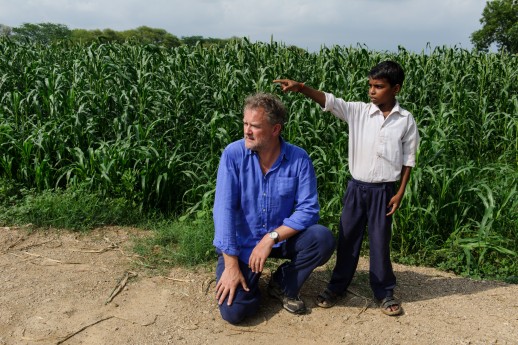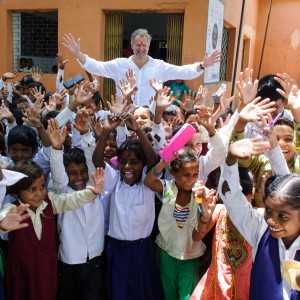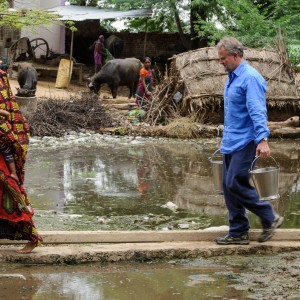An article Hugh wrote about WaterAid in India
When actor and WaterAid ambassador Hugh Bonneville travelled to India last summer, he saw how safe toilets can change everything for a community.
I look at my loo differently from the way I did a few months ago. Before I visited rural India of course I understood how important toilets are to basic standards of health, but the stark reality of not having access to them was something I had never really thought about.
In the world’s wealthier countries, we take toilets for granted. We expect decent bathrooms in the workplace, in restaurants and in schools; many homes have more than one bathroom. We consider such facilities to be fundamental to society, enabling people to be healthy and, thereby, to be productive.
During my trip, I saw first-hand how much toilets, or the lack of them, affect every single aspect of daily life. Without toilets, people are forced to go in the open – routinely, day and night. And I’m not talking about a small, unfortunate group. It is an enormous problem in India, where 44% of the population practises ‘open defecation’ – an astounding 569 million people. The figure worldwide is 946 million.
A dangerous environment
I had been to India before, but my trip with WaterAid took me to places a far cry from the well-trodden routes I had backpacked 30 years earlier. The experience was eye-opening.
We visited a community where a lack of proper sanitation in homes and in school, coupled with poor hygiene, has a detrimental impact on people’s lives every day, damaging their health and their prospects.
In Narai Ka Pura in Madhya Pradesh, a ten-year-old boy named Pradeep showed me the barley fields on the edge of the village in which the men, women and children of the community relieve themselves – amid the very crops on which they depend for food.
The resulting unhygienic environment means deadly diseases can spread at an alarming rate. Add to this a lack of knowledge about basic hygiene practices and one can see immediately how disaster for entire communities is a constant threat and often a devastating reality.
More than 140,000 children die every year in India alone from preventable diarrhoeal diseases, and many more suffer lasting effects. Relentless bouts of sickness prevent people from having time for an education, paid work and family responsibilities. People are trapped in a cycle of poverty.
Children at risk
These are not only problems in remote communities. More and more people in developing countries are migrating to cities in search of better lives for their families but finding that the only land on which they can make a home has nothing in the way of safe water or sanitation. In the crowded slums that develop, with open defecation and unprotected water, life-threatening diseases thrive.
Children are especially vulnerable, with long-term consequences. An estimated half of child undernutrition is associated with repeated diarrhoea or intestinal worm infections caused by inadequate water, sanitation or hygiene.
Even if they can get enough to eat, kids might still be undernourished because their bodies do not have chance to absorb the nutrients. Malnourished children are more vulnerable to disease and their development is often impaired, meaning the effects of dirty water and poor sanitation stay with them for life.
It doesn’t have to be this way.
A brighter future
Later in my trip to India, I visited the village of Mahadev Pura, where WaterAid has been working. Here, access to improved sanitation and safe water has made an astonishing difference.
The kids showed me the playground games that help them learn about good hygiene, and the headteacher told me how the pupils’ lives have been transformed, with absenteeism through sanitation-related illnesses a thing of the past. These kids have brighter futures simply because they now have access to loos and clean water.
In 2014, India’s President Narendra Modi launched the Clean India Mission, aiming to end open defecation by October 2019. With so many millions lacking facilities and having to change habits established over generations, some would say this is an unrealistic goal. But with this amount of political will there is hope it can be achieved.
With the new UN Sustainable Development Goal on universal access to water and sanitation also driving change, and with organisations like WaterAid working hard on the ground, this is a pivotal time for sanitation across the globe.
It was quite overwhelming to witness what a difference something as simple as a toilet can make to the lives of entire communities. Surely it is unacceptable in this day and age that two billion people across the world still do not have this basic necessity. Clean water and sanitation transform lives; it really is that simple.
In 2015, world leaders made a promise to reach everyone everywhere with taps and toilets. Tell the UK Government to keep its promise and lead the way in achieving this life-changing goal. Sign the petition >
Watch @hughbon in India with @WaterAidUK and see how clean water & toilets transform lives, for good. #DowntonAbbeyhttps://t.co/0LlWUADtkm
— WaterAid UK (@WaterAidUK) August 10, 2016











